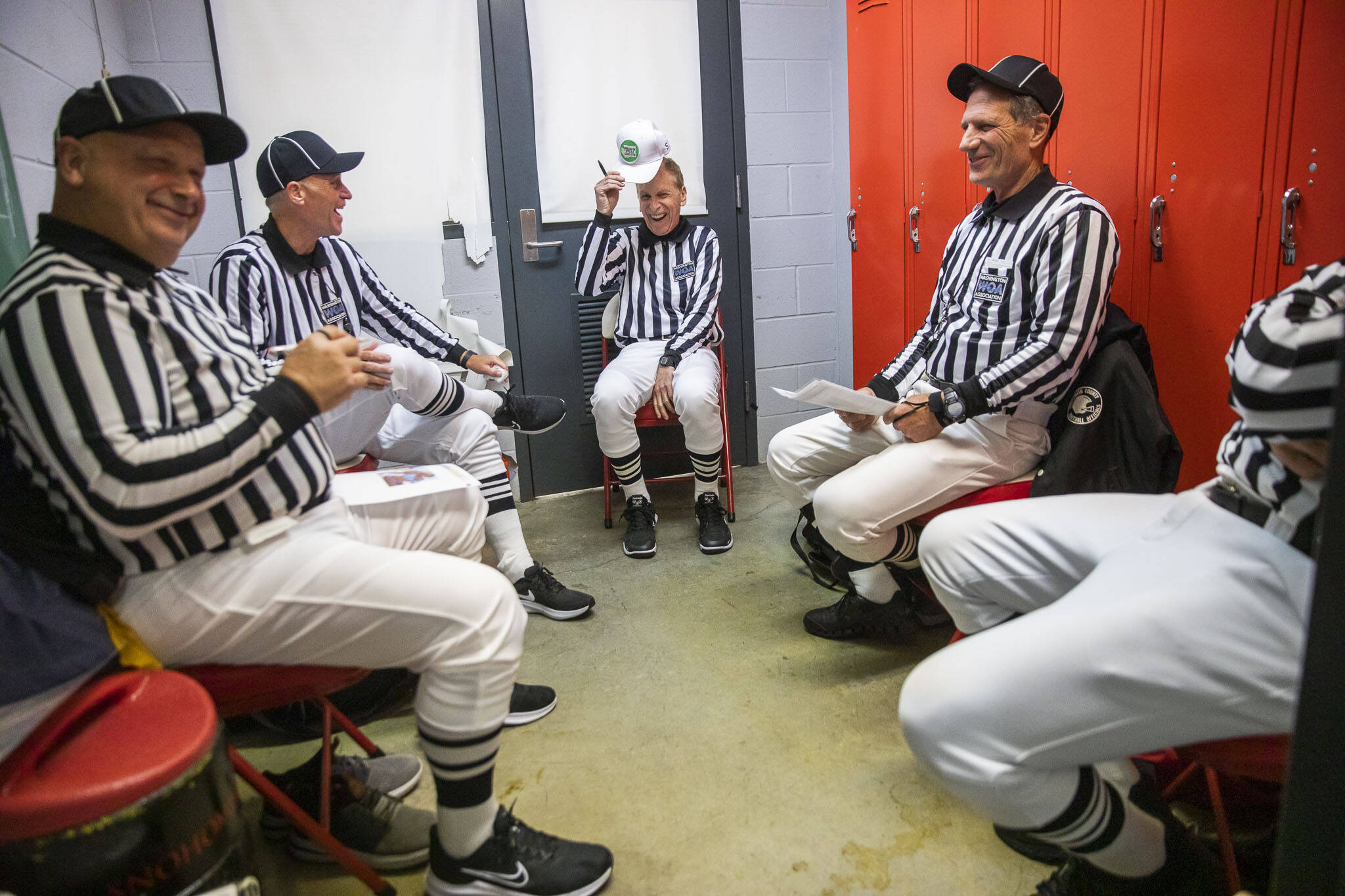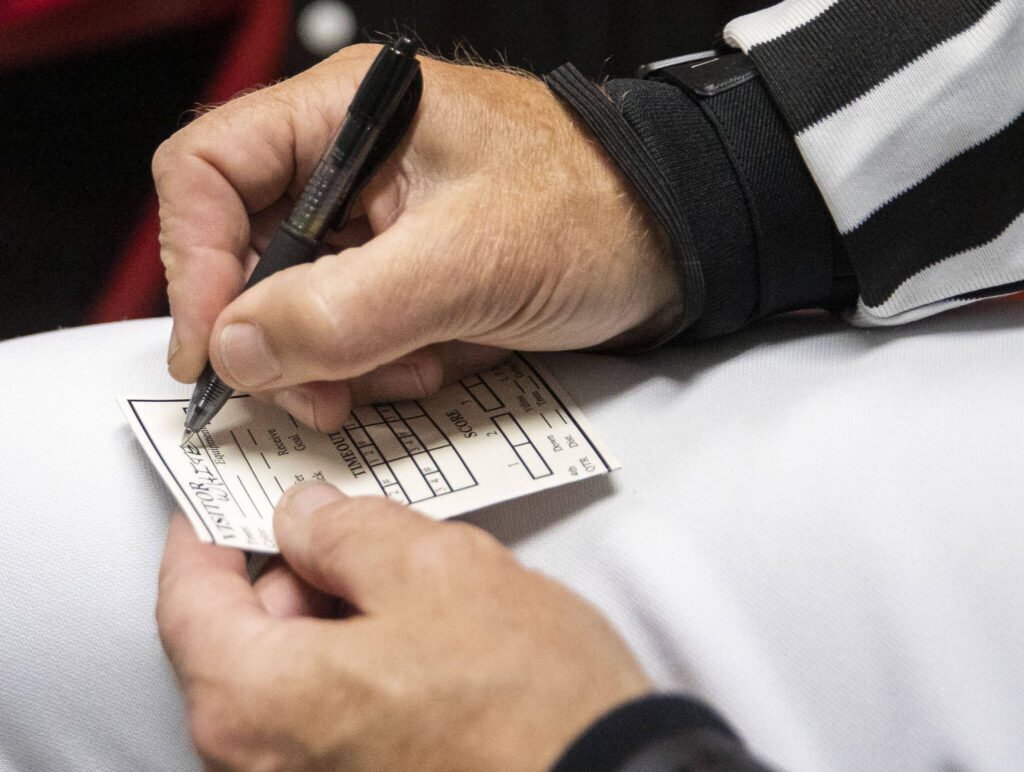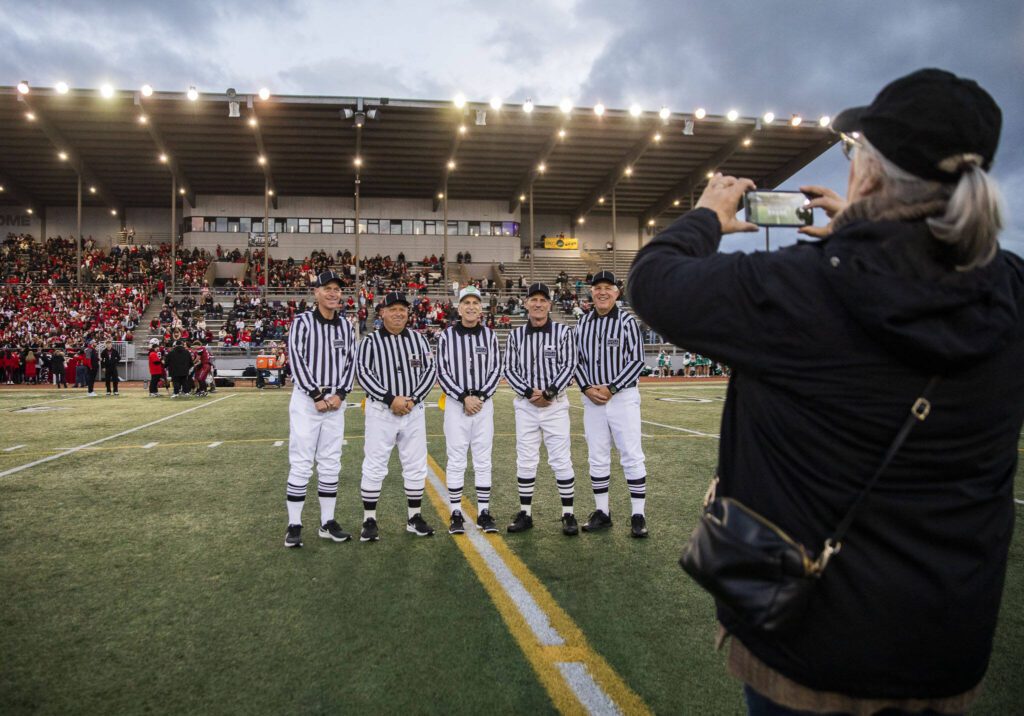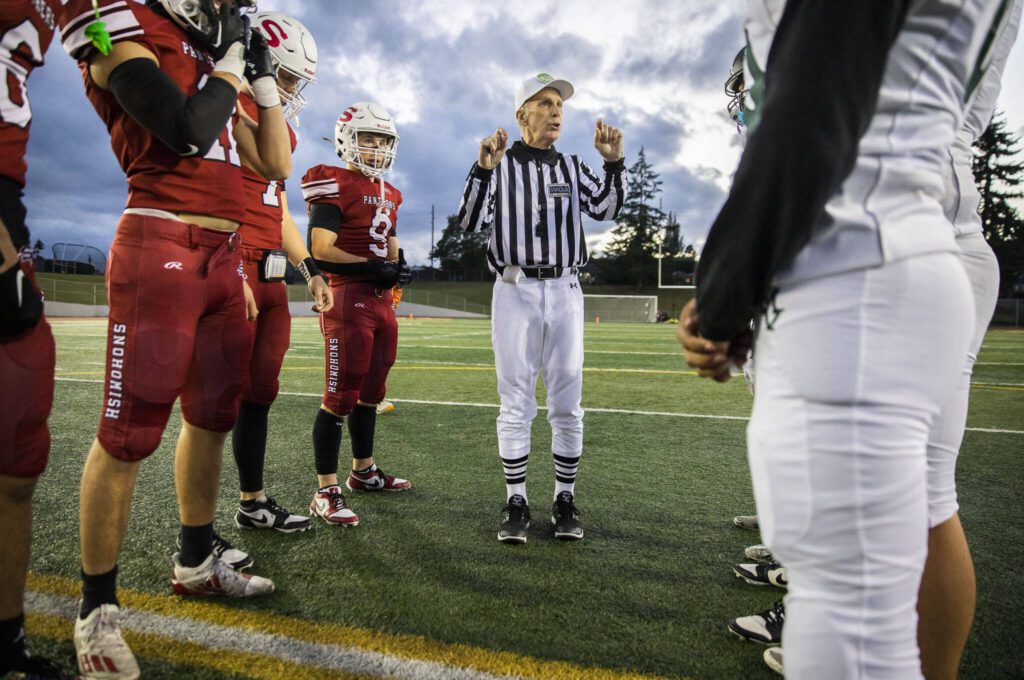Tom Freal, Ross Noe, Jim Brotten, Dean Corcoran and Steve Jensen have all served as the referee for a Friday night high school football game.
They’ve donned the white cap and have had the honor to be the leader of the officiating crew. They are the center of attention and the recipient of much verbal frustration from coaches, players and spectators when they face the home stands and press box to communicate a penalty that they or a fellow official witnessed to keep the game under control and flowing in a fair manner.
On Oct. 4 for the Wesco 3A/2A North matchup between Mount Vernon and Snohomish at Veterans Memorial Stadium, the coaches, players and spectators witnessed a unique officiating crew that never gave up on the job.
It was the first time Freal (50 years of experience), Noe (46 years), Brotten (41 years), Jensen (38 years) and Corcoran (37 years) took the field as one crew. Freal was the referee, Corcoran the umpire, Brotten the line judge, Noe the linesman and Jensen the back judge.
It was a decision that Jensen, who’s served as the Snohomish County Football Officials Association’s assigner for the past 15 years, saw as an opportunity to get everybody on the same game before the season concludes in November and retirement considerations begin.
“I took the five most tenured officials (and) put them on that crew,” Jensen said. “We’ve been doing it combined 212 years and kind of got brotherhood in our association. We’re all really close. We’ve all been officiating with each other … (and) built friendship over all those years.”
The pregame talk
Every officiating crew has pregame and postgame discussions. Pregame talks involve communicating everyone’s responsibilities, and postgame talks recap the game, its successes and areas of improvement.
Freal, for every game he’s officiated, has distributed cards to his crew with pregame topics.
“(Tom) has a card that’s laminated, colored, and he goes through all of the specific incidents and what we have to do as a crew and our responsibilities of just about all circumstances,” Noe said. “Last Friday night he handed them out to us, and he said, ‘We’re not talking about any of that. We’re just talking about old times.’”
Corcoran, who’s served as the Washington Officials Association’s president for the past 12 years and was the youngest-experienced crew member, said, “We’re friends with each other, and it was just really fun to do because obviously with that much experience, if you’re still doing it, you must be doing something right.”
Freal said he did give his crew one piece of advice before they left the locker room, “Work hard, have fun, enjoy the game.”
Officiating across the country and in Snohomish County
Referee is a national sports officiating magazine based in Wisconsin. In its largest survey conducted in 2020 that compiled answers from nearly 17,500 officials, results showed the average age of officials across all sports is around 53 years old. The average age for football, basketball and baseball was 54, volleyball 55, softball 56 and soccer 50.
Regarding sportsmanship, 57% of officials stated it has worsened, and the decline is seen mostly in youth competitive sports (36%), followed by adult recreational (21%), high school (14%) and youth recreational (13%). The top cause for this was parents (39%) followed by coaches (29%) and fans (18%).
“If you’re a kid and you like being outdoors and athletic, pick your favorite sport and go join because it’s a nice way to make a little extra money and have fun doing it,” Corcoran said. “But one of the biggest problems is sportsmanship has declined tremendously. And it’s not really even the coaches or the players because we can actually do something about that. It’s the parents.
“They’re just brutal to our newer officials. And it’s hard to get them to come back for the second year or even finish the first year because they get out there and they say, ‘I had no idea people were going to be yelling at me, calling me names,’” he continued. “And I’m like, ‘Yeah, you just have to have very thick skin to do this. And just remember that those people don’t know the rules. They’re called fans, and that’s short for fanatics, and that’s what they are.’”
Jensen, the second youngest-experienced crew member, is an alumnus from Lakewood High School, and he attended many of his father’s games growing up. He followed in his father’s footsteps and began officiating the year he graduated.
“We are really, really lucky in Snohomish County football. I think we’re the strongest stronghold in the state. A lot of associations have to cancel games or move games because they can’t cover them. And in 15 years of being the assigner, I’ve never had to do that,” Jensen said. “We got about 85 officials. We need more. Absolutely. We have a lot of really, really good people that will do anything to make it work. They don’t want to have kids have to cancel a Friday night football game. We have guys that will rearrange their vacation or rearrange whatever to make sure they’re available. … We have a really, really good group of guys that work really well together and are in it for the right reason. And the right reason is to give back.”
Noe, a Cascade High School graduate, and Freal, a Snohomish graduate, both began officiating in the 1970s; Noe was 23 years old and Freal a teenager at the time.
Noe was working at grocery store in Everett when he recognized a customer who came in one day who was a basketball and football official. Noe told him he wanted to officiate basketball, but the customer said the area needed more football officials than basketball at the time.
“I went to the first meeting and signed up,” Noe said. “And I was working my first year scared as the devil to even be out there much less make a call.”
One of the fondest memories Noe recalled was during a Snohomish-Lake Stevens game about eight years ago. Noe and Panthers coach Mark Perry had a mild-tempered altercation during a timeout.
“I’m on Snohomish’s sideline. Mark called for a timeout in the middle of the second quarter. And I looked at my card because we have to report or at least dictate how many timeouts they have per half. And I said, ‘Mark, I have you down as three. You’ve already taken all three of your timeouts.’
“And he went a little ballistic. … So I called timeout and went to my white hat and said, ‘How many timeouts does Snohomish have?’ And he said, ‘They’re out. They’ve already taken their three.’ (I said,) ‘OK. Mark, you’re out.’ He goes, ‘Ross, I can’t believe you missed that.’
“I came home, and my wife was barely awake. And I came in the room, and she said, ‘Do you know a Mark Perry?’ And I said, ‘Yeah.’ She said, ‘He called here to apologize. You were right. He had already taken his three timeouts.’ And I said, ‘Well there’s a class act.’”
Officials retiring, replacements limited
Though SCFOA is fairly steady with numbers, especially after losing many during the pandemic, Corcoran said the turnout is still not where it should be.
“We have one woman in our group,” he said, “And I know there’s a lot of women football fans out there, and that’s a huge untapped pool for us.”
SCFOA has also presented at schools for incoming freshman and their parents about the challenges retaining officials.
“The freshmen and JV levels, you’re going to get some newer officials that are just learning. Give them some grace because we want to keep them around,” Corcoran said. “The only way they’re going to be great officials is if we can keep them for four or five years. And if you brutalize them on their first game out, they’re not going to be back.
“Referees are people too,” he continued. “We’re your neighbor. We shop at the same stores you do, we go to the same churches. And I tell them, ‘If anybody treated you at your job like you treat officials at their job, you would be to human resources saying, ‘This is outrageous.’ But somehow it’s OK in sports to do that.”
Brotten said he’s made many mistakes in games, and it’s not something he can let go of easily. He added that officiating is a fun way to be a part of the action, and one tip of advice he would give to novice officials is, “Don’t give up. Better times will come. Just keep studying the rules.”
“Good rule knowledge will get you through just about anything because if you don’t know the rules and a coach is coming down on you, then you don’t have any credibility,” he said.
Corcoran described the mission of referees as an “extension of the classroom.”
“Athletics are valuable life skills that are desperately needed, and I like that we’re teaching kids how to win and lose gracefully and show compassion, sportsmanship and teamwork. And to me those will benefit you in life even if you’re not going to be a million-dollar athlete.”
WOA is always accepting applications for referees. Interested candidates can submit their information online and will be contacted by the respective sport assigner.
“Remember you’re doing a good thing for the youth,” Jensen said. “You’re giving back to the youth because without us, there wouldn’t be games. And you are doing something bigger than officiating.”
Talk to us
> Give us your news tips.
> Send us a letter to the editor.
> More Herald contact information.
































